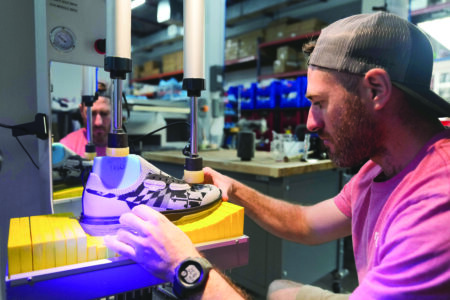Summer of study
McNair Scholars present research projects

An audience listens to presentations at the recent McNair Fall Symposium in Mead Auditorium at Northern Michigan University. McNair Scholars gave short talks on their summer research projects. (Journal photo by Christie Bleck)
- An audience listens to presentations at the recent McNair Fall Symposium in Mead Auditorium at Northern Michigan University. McNair Scholars gave short talks on their summer research projects. (Journal photo by Christie Bleck)
- Northern Michigan University student Lexu Arroyo gives her presentation at the recent McNair Fall Symposium in Mead Auditorium at NMU. McNair Scholars gave short talks on their summer research projects. (Journal photo by Christie Bleck)
McNair Scholars delivered 10-minute talks on their summer research endeavors in Mead Auditorium in the West Science Building. These talks, which were open to the public, provided an opportunity for students interested in McNair to learn more about the program and connect with staff and other students.
“We look forward to hearing what it is you have to say,” said Dr. Lisa Eckert, interim dean of NMU graduate education, before the students gave their presentations.
The McNair Scholars Program, a federal TRIO program funded by the U.S. Department of Education, is designed to prepare undergraduate students for doctoral studies through involvement in research and other scholarly activities, according to mcnairscholars.com.
McNair participants are either first-generation college students with financial need, or members of a group that’s traditionally underrepresented in graduate education and have demonstrated strong academic potential.

Northern Michigan University student Lexu Arroyo gives her presentation at the recent McNair Fall Symposium in Mead Auditorium at NMU. McNair Scholars gave short talks on their summer research projects. (Journal photo by Christie Bleck)
The goal of the program is to increase graduate degree awards for students from underrepresented segments of society.
Presenters and their research projects were:
≤ Katie Bortz – Biology – “African Freshwater Crab Systematics: The Taxonomic Status of the Genus Potamautes”;
≤ Abdi Haji – Environmental Studies – “Novel Approaches to Improving Public Transportation in Rural Communities”;
≤ Lexu Arroyo – Medicinal Plant Chemistry | Biochemistry – “Rapid Diagnostic Assay with Colorimetric Detection for HIV, using Loop-mediated Isothermal Amplification with Targeted Nucleic Acid and Gold Nanoparticle Reporter System”;
≤ Jordan Wallace – Clinical Laboratory Sciences – “Testing Artificial Gene Control via Designed DNA Looping in Living Bacteria”;
≤ Cynthia Benson – Criminal Justice – “Patterns of Justification: An Analysis of Resignation Letters Written by Male-on-Male Child Molesters within the Boy Scouts of America”;
≤ Mandy Joslyn – Forensic Biochemistry – “Detection of the Necrobiome Following Human Decomposition”;
≤ Rachel Bazen – Neuroscience – “Haptic Distal Spatial Perception Mediated by Strings: Perception of Planar Object Shape from Motion”;
≤ William Soper – Economics – “The Mathematics Behind Social Sciences”;
≤ Kim Santiago – Biology: Pre-med – “Assessment of Dynactin Expression in Presynaptic Motor Neuron Terminals of Mice Deficient in Muscle-synthesized BDNF”;
≤ Ryan Meister – Economics – “Migration in Michigan’s Upper Peninsula (2006-2015)”;
≤ Sara Larson – English – “Creation of Tales of the Crew of the Meili Vol. 1”;
≤ Isabelle Tavares – Environmental Studies and Sustainability – “American Society of Magazine Editors: Editorial Internship with Reader’s Digest”;
≤ Amanda Marinoff – Art and Design – “Painting, Thoughts and Processes”;
≤ Malachi Tripaldi – Anthropology – “An Almost Micro-usewear Analysis of Beaver Island Lithics”; and
≤ Chris Kailing – Biology: Ecology – “Using Local Knowledge to Optimize Live-Capture of American Marten.”
Some of the presentations were highly technical in nature while others focused on more broad sociological topics.
One of those was Haji’s talk on rural public transportation and how bus transportation can be increased on the NMU campus.
He noted that the use of the Rapid, a public transportation system based in the Grand Rapids area, increased through a partnership with Grand Rapids Community College, Grand Valley State University and Ferris State University.
“Cooperation between the city and the local university is a must in order to make the bus transportation the most convenient and to enhance and improve the public transportation of rural communities,” Haji said.
As assumption, he noted, is that bus service primarily is for the elderly and the poor.
“We need to change that mindset,” he said. “It’s for everyone.”
Haji believes a trial bus that runs — on time — from K.I. Sawyer to Marquette might be a way to increase public transportation, with NMU students possibly using it.
Benson addressed resignation letters written by child molesters in the Boy Scouts of America.
She noticed the trend of allowing them to resign so no criminal charges would be filed.
“A lack of consequence is not a deterrent for this type of behavior,”Benson said.
Benson noticed the top excuse was “for personal reasons.”
The publication “2018-19 Northern Research & Discoveries” included an article on Ashley Keiser, Ph.D., a former McNair Scholar who completed her undergraduate degrees in psychology and sociology at NMU in 2013, and then went to grad school at the University of Michigan where she received her doctorate in biopsychology in 2018.
Keiser, a first-generation college student, now is a postdoctoral fellow at the University of California-Irvine.
“The McNair Scholars program has no doubt played a huge role in my preparation for graduate school,” Keiser was quoted as saying. “I am grateful to McNair for allowing me the opportunity to conduct research over the summer and present this research at scientific conferences where I was able to network with potential graduate school advisors.”
Christie Bleck can be reached at 906-228-2500, ext. 250.







